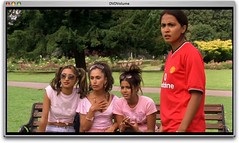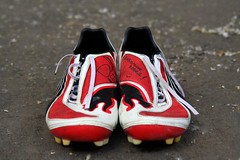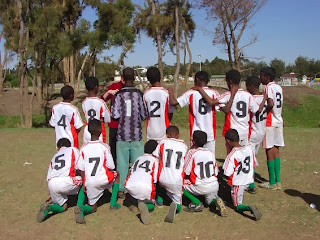 |
Lisa and her daughter at St. Maryam Deira
Chapel in Keren |
My first trip to Keren was not
our trip to the camel market. My first trip was with Lisa, another jewel in Asmara, as she traveled to meet with a group of children at the Keren library where the embassy had set up an American Corner. I don't recall how I met Lisa.
Jewel probably introduced us.
American Corners were a new concept at the time. They were an approach to deal with funding shortages and to address the number of Public Diplomacy Branch Offices that had been closed over the years. American Corners have no American staff assigned to them. They also have no locally hired staff. Most of them are in public libraries where a room or literally just a corner of space is set aside for equipment, books and other English language materials provided by the embassy for use by anyone who visits the location. In Keren, the American corner had an assortment of English books for both children and adults as well as one computer for Internet access. And one Saturday a month Lisa traveled from Asmara to Keren to challenge the children who gathered there to learn English.
 |
| More camels in Keren |
Lisa was in Eritrea as a result of a visit the previous year when she came from Texas with her daughter to visit her brother, the former Defense Attache at the embassy, and his family for three weeks. She fell in love with the country, applied for a job with a local interrnational school, returned to Texas, divorced her husband, sold her house, packed up everything she owned, and traveled back to Eritrea. She admitted later the divorce wasn't quite as capricious as that description of events suggested since she and her husband had been separated for more than a year, but it made a good story that quickly got across the depth of her feeling for the country and the people.
Teaching third graders five days a week, however, wasn't enough to keep Lisa busy. She thought about how much her daughter had enjoyed going to the library for story time when she was younger, and that got Lisa thinking about how she could create that type of experience for the children of Eritrea. Initially she approached the British Council since they had an active English teaching program. They were happy to give her time and space to teach children, but they didn't give her the flexibility she was looking for. She just added evening teaching to her schedule, not the means to create something new.
After a few months, she approached Ilya, the public affairs officer at the embassy to ask if she could try something new at the American Center, across the street from the embassy. Ilya agreed. So Lisa put together a one page invitation that she handed out one Saturday morning to all the children playing outside the American Center. The invitation was for the following Saturday morning. She told the children to bring the paper with them when they came.
 |
| Tukul homes in Eritrea outside Keren |
On that first day, there were only a few children who showed up. At the end of the hour, Lisa handed out invitations to all of the children again and told them they could bring friends, too. Each Saturday more children came, until Lisa was teaching more than 100 children at a time.
But what Lisa did with the children was much more amazing than what I expected from a classroom. First, there were no tables and chairs or desks. There was just a large room that Lisa filled with music, song, stories, and activity. The children weren't grouped by age or English ability. The children ranged in age from 4 to 14, boys and girls, and they were all in the same room together. Lisa used early childhood education methods which she made work for the entire range.
Early childhood education methods involve lots of activity. Lisa would sing songs to the children and then have them join in with her to sing the same songs. She used gestures to illustrate the songs and got the children to follow her lead. It wasn't surprising to see the young children join in, but the older ones, even the boys, were moving right there with her.
After a few songs, she started in with books. The day I was with her in Keren, she had drawings of the characters in the picture book Brown Bear, Brown Bear, a book that is intended to introduce colors to preschoolers. The story goes like this:
"Brown Bear, Brown Bear, what do you see? I see a [character name] looking at me." That was followed by "[Character name], [Character name], what do you see? I see a [Different Character Name] looking at me." Other characters include Yellow Duck, Purple Cat, Blue Horse, White Dog, Green Frog, Goldfish, Black Sheep, and Red Bird.
 |
| Brown Bear, Brown Bear, what do you see? |
She asked for volunteers for each of the characters and had them line up in front of the rest of the students with the pictures. She had them tell the story using the pictures to indicate the order of the characters and their memory of the words. I was amazed as the children repeated the story, although I knew it wasn't the first time they had heard it. Then she asked for different volunteers and the new group repeated the story for the rest. I could envision the next step being a change in the pronouns. Instead of "Brown Bear, Brown Bear, what do you see?" it would be "Brown Bear, Brown Bear, what does
she see?" Or "what does
he see?" to introduce the third person pronouns and the third person form of the verb
to do. And then next the whole thing could be made past tense. "Brown Bear, Brown Bear, what
did you see? I
saw a red bird looking at me." And then future tense. "Brown Bear, Brown, what
will you see? I'
ll see a red bird looking at me." Maybe that was Lisa's plan.
After a few weeks of success in Asmara, Lisa asked if she could do the same in other towns. Since Keren was within
the 50-mile radius of Asmara that didn't require approval from the government, that was the first town added to her program one Saturday a month.
When she and the driver arrived to pick me up, they were at least half an hour later than I had expected. When I got into the car, I asked Lisa what would happen if we arrived late. She assured me the children would wait however long it took for us to get there. She was right. We were nearly an hour late, but the library was full of children. And an hour later when we were done, they begged her to stay longer. These were Lisa's kids and they loved her as much as she loved them.
But Lisa's contributions to kids in Eritrea didn't end there. She knew that children needed shoes or they wouldn't be allowed to go to school. When she saw children on the streets of Eritrea without shoes, she gave them a voucher for a pair of shoes at a shop where she had arranged with the owner to pay for each voucher he returned to her. Soon children throughout the city learned of her deal and found their way to her door to ask for vouchers. She never turned any away.
Lisa's example reawakened the feeling in me that there might be some purpose, some calling, for my stay in Eritrea. I found it very shortly afterwards, but I think meeting Lisa was a necessary prelude to my recognizing my calling.



















































